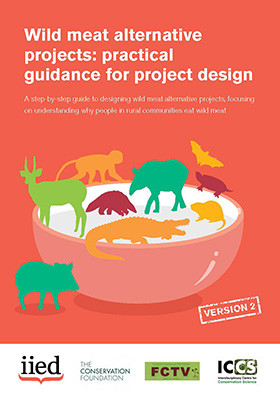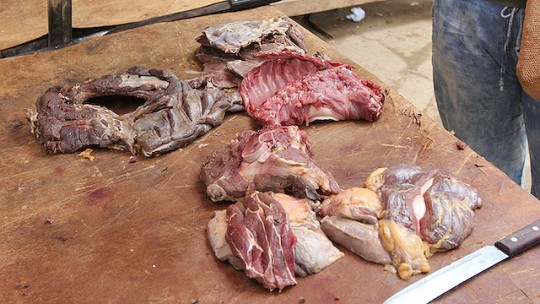University of Oxford
11a Mansfield Rd
OX1 3SZ
UK

IIED and partners have released a tool, available in multiple languages, to support practitioners to find sustainable alternatives to wild meat that work for rural people.

Bushmeat at the market in a Brazilian town (Photo: copyright Barbara Fraser/CIFOR)
Wild meat alternative projects are commonly used to try to curb or replace the consumption of wild meat with more sustainable options, especially where hunting is illegal or unsustainable.
However, the success of past projects has been mixed, in part because projects are often developed with poor understanding of why people eat wild meat in the first place.
Now, a decision support tool has been produced to provide step-by-step guidance for conservation practitioners on how to design projects to reduce the consumption of wild meat by promoting alternative sources of protein.
The tool focuses on the early research and design phase of project development, and promotes the use of participatory research methods to explore local preferences in-depth, before any project implementation begins.
The tool was developed by IIED, the Interdisciplinary Centre for Conservation Science at the University of Oxford, Fondation Camerounaise Terre Vivante and The Conservation Foundation.
It was based on research conducted through the Darwin Initiative-funded project ‘Why Eat Wild Meat: developing effective alternatives to bushmeat consumption’.
Step-by-step guidance
In five comprehensive steps, and drawing on example case studies throughout, the decision-support tool explains how practitioners can help to develop the right project for the community in which they work, and support communities to develop their own sustainable alternatives to illegal and/or unsustainable hunting.
The guidance includes:
- How to assess a project’s feasibility
- How to complete a situational and stakeholder analyses and carry out in-depth interviews on why people eat wild meat and the desirability of different alternatives, and
- How to create a theory of change.
Dilys Roe, principal researcher at IIED, said: “Following feedback on an early version of the tool from representatives of organisations that implement design and implement wild meat alternative projects, or are conducting related research, the decision support tool has now been released in its final form. We are encouraging anyone involved in the design of alternatives projects to use it for their own work.”

Download the tool
The tool is available in English and French. Further versions in Spanish and Portuguese will also soon be available to download from the project page.
Learn more from a Why Eat Wild Meat and TRADE webinar
To hear more about the decision support tool and the project you can watch a recording of a webinar exploring why people eat wild meat and how to design interventions that can help improve sustainability and safety. The webinar was co-hosted by IIED’s Why Eat Wild Meat team and the TRADE hub project as part of the IIED Debates series.
Online survey
The team behind the tool is also carrying out an online survey to learn if and how understanding of food choice as a driver of consumption has changed, and to gather feedback on the decision support tool. The survey takes around 10-15 minutes to complete.
For government officials, donors and NGO staff and academics working in sub-Saharan Africa, please complete this survey.
For practitioners, including those involved in designing and implementing wild meat alternatives projects (commonly referred to as alternative protein or alternative livelihoods projects) in sub-Saharan Africa, please complete this survey.
Contact
If you are interested in using the decision-support tool in your organisation or want to find out more about the research, contact Stephanie Brittain (stephanie.brittain@biology.ox.ac.uk)
This blog was originally posted on the IIED website here.

